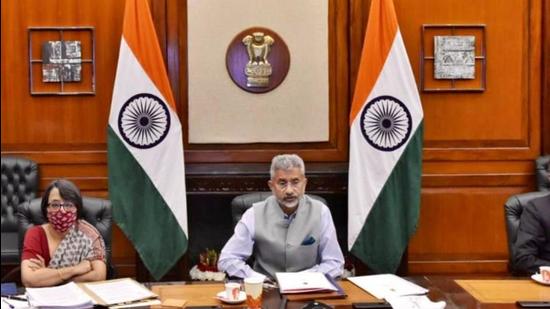BIMSTEC finalises major connectivity master plan for Bay of Bengal region
Addressing the meeting, EAM Jaishankar said the master plan will be an important step towards fulfilling the people’s aspirations for better connectivity and integration.
Foreign ministers of the Bay of Bengal Multi Sectoral Technical and Economic Cooperation (BIMSTEC) grouping on Thursday endorsed an ambitious air, land and sea connectivity master plan that is expected to be adopted at a summit later this year.

The BIMSTEC Master Plan for Transport Connectivity is the outcome of more than a decade of discussions among members of the grouping – India, Bhutan, Bangladesh, Nepal, Myanmar, Sri Lanka and Thailand – and studies by the Asian Development Bank (ADB) in 2007 and 2014 that identified 167 connectivity projects in the region at an estimated cost of about $50 billion.
The virtual ministerial meeting endorsed the master plan for adoption at the BIMSTEC summit to be held in Sri Lanka in the next few months. It also endorsed three agreements to be signed at the summit – a convention on mutual legal assistance in criminal matters, an MoU on cooperation between diplomatic academies of member states, and a memorandum of association for establishing a technology transfer facility in Colombo.
Addressing the meeting, external affairs minister S Jaishankar said the master plan will be an important step towards fulfilling the people’s aspirations for better connectivity and integration. He said the grouping should put in place a legal framework for smooth connectivity by speedily finalising the BIMSTEC coastal shipping agreement and motor vehicles agreement.
“Next year will be the silver jubilee of the establishment of the BIMSTEC. It is high time that we dwell upon how to make a paradigm shift in raising the level of our cooperation and regional integration,” Jasihankar said.
<blockquote class=”twitter-tweet”><p lang=”en” dir=”ltr”>Participated at the 17th BIMSTEC Ministerial Meeting. <br><br>Recognise the progress made by BIMSTEC in recent years, including:<br><br>1. Implementation of BIMSTEC Startup Conclave, Ministerial Conclave and Seminar on Climate Smart Farming Systems <a href=”https://t.co/OaOYDAHNcl”>pic.twitter.com/OaOYDAHNcl</a></p>— Dr. S. Jaishankar (@DrSJaishankar) <a href=”https://twitter.com/DrSJaishankar/status/1377640796283924483?ref_src=twsrc%5Etfw”>April 1, 2021</a></blockquote> <script async src=”https://platform.twitter.com/widgets.js” charset=”utf-8”></script>
Though the ADB studies identified 167 connectivity projects, BIMSTEC has prioritised 66 of them to establish seamless multi-mode transport links and smooth and simplified transit facilities through the development and modernisation of highways, railways, waterways and sea and air routes. The BIMSTEC master plan will also promote synergy with other connectivity frameworks such as the ASEAN master plan on connectivity 2025.
Some of the arterial links included in the master plan are the India-Myanmar-Thailand trilateral highway, Kolkata-Birgunj and Kolkata-Kathmandu links, Kolkata-Siliguri-Guwahati-Imphal link, and Kandy-Colombo link. India’s northeastern states form a key part of the master plan, with several road and river links passing through the region.
Jaishankar reiterated India’s commitment to build on the momentum for regional cooperation under the BIMSTEC framework and to make the grouping more result-oriented.
India has turned to regional groupings such as the BIMSTEC to drive connectivity and economic initiatives after its differences with Pakistan held up cooperation under the umbrella of the South Asian Association for Regional Cooperation (SAARC).
“BIMSTEC enjoys the unique strength of connecting South and Southeast Asia. It has steadily gained prominence in our foreign policy. Participation of BIMSTEC leaders at our government’s swearing-in ceremony in May 2019 was a testament to it,” Jaishankar said.
However, he cautioned that members of the grouping face traditional and non-traditional security challenges. “Our NSAs have met thrice since 2017. They have been working closely and have moved forward in several aspects of security cooperation, including counter-terrorism, intelligence-sharing, coastal security [and] cybersecurity... in a tangible manner,” he said.
The BIMSTEC convention on cooperation in combating international terrorism, transnational organised crime and drug trafficking came into force last month, and will provide a legal basis to strengthen cooperation in this field, he added.
Get Current Updates on India News, Lok Sabha Election 2024 live, Infosys Q4 Results Live, Elections 2024, Election 2024 Date along with Latest News and Top Headlines from India and around the world.




